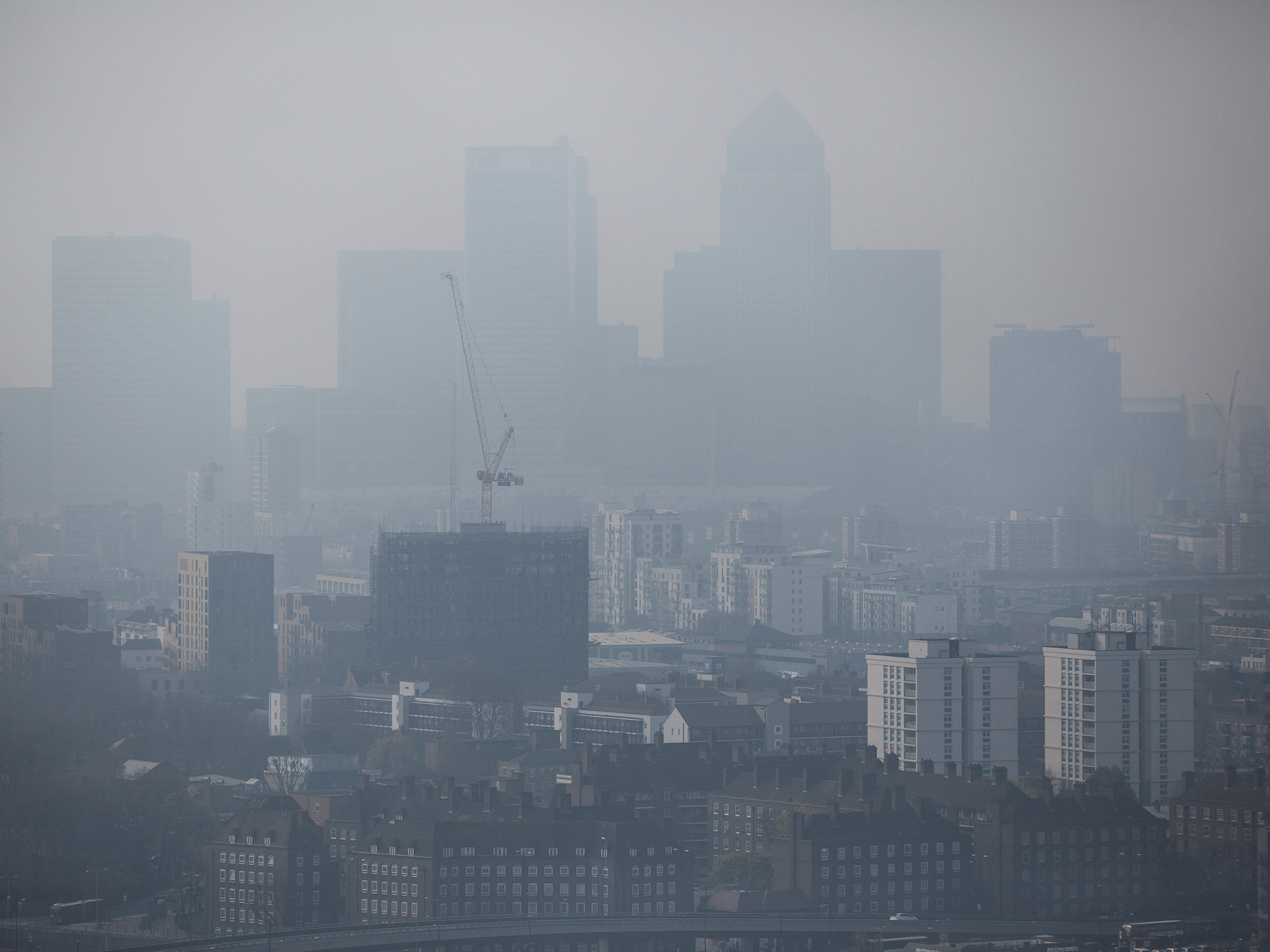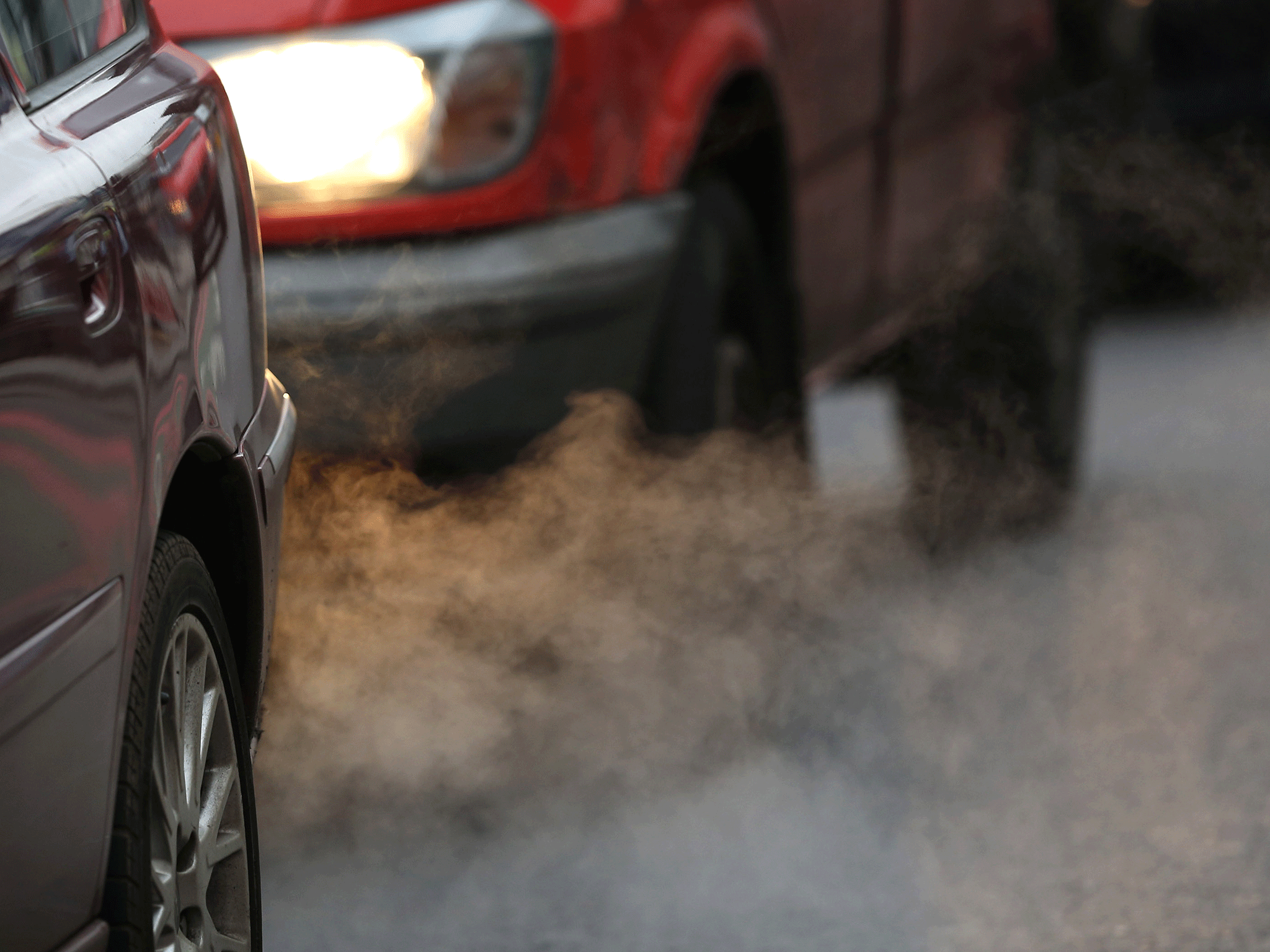Air pollution in London caused early deaths of nearly 9,500 people in a single year, study finds
Researchers find the number of premature deaths caused by air pollution was higher than previously thought

Your support helps us to tell the story
From reproductive rights to climate change to Big Tech, The Independent is on the ground when the story is developing. Whether it's investigating the financials of Elon Musk's pro-Trump PAC or producing our latest documentary, 'The A Word', which shines a light on the American women fighting for reproductive rights, we know how important it is to parse out the facts from the messaging.
At such a critical moment in US history, we need reporters on the ground. Your donation allows us to keep sending journalists to speak to both sides of the story.
The Independent is trusted by Americans across the entire political spectrum. And unlike many other quality news outlets, we choose not to lock Americans out of our reporting and analysis with paywalls. We believe quality journalism should be available to everyone, paid for by those who can afford it.
Your support makes all the difference.Nearly 9,500 people died early in a single year as a result of long-term exposure to air pollution in London, according to new research.
Researchers from King's College London found the number of premature deaths caused by air pollution was higher than previously thought after taking into account the effects of both airborne particles, also known as PM2.5, and nitrogen dioxide (NO2), a toxic gas which is largely a by-product of diesel engines.
It is believed to be the first time an attempt has been made to quantify the health and economic impacts of NO2, with previous studies focusing only on PM2.5.
The researchers estimated the number of premature deaths associated with PM2.5 in 2010 was 3,537, while the number of deaths associated with NO2 was believed to be 5,879 – creating a total of 9,416 premature deaths attributed to air pollution.
In January this year it was reported that NO2 levels in Oxford Street had exceeded the legal limit for the whole of 2015 in the space of just four days – while the limit was also breached in Putney High Street a day later.
Meanwhile in April the Supreme Court ordered the government to take action to bring UK air pollution within legal limits after a case was brought by environmental law group ClientEarth.
The new report, put together for the Greater London Authority, has found that most of the deaths caused by NO2 were linked to road transport and other sources from within the city, while health issues caused by PM2.5 were predominantly from particles created outside of London, including emissions transported from Europe.
The Mayor of London Boris Johnson has now called for the UK government and the EU to take further action to improve air quality across Europe in the wake of the latest research.
Simon Birkett, founder and director of Clean Air In London, applauded Mr Johnson "for leading the world by publishing the first estimates for the number of deaths attributable to nitrogen dioxide (NO2) as he famously did for particles in 2010" but also called for a ban on diesel from the most polluted areas by 2018.
He said: "These estimates will send shockwaves around the world. We were expecting bad news given scientists say many roads in central London will tend to have the highest concentrations of NO2 in the world and levels in Oxford Street are well over three times the legal limit that have been in legislation since 1999 to be met by 2010. But these numbers are much worse than the 7,500 total deaths attributable to long-term exposure to air pollution that we estimated from the Mayor’s Ultra Low Emission Zone consultation documents late last year."
The Mayor of London's office has said due to the fact the data is five years old, it will not include the impact of measures implemented since 2010. These include the tightening of Low Emission Zone standards, the delivery of more than 1,300 hybrid buses and the introduction of age limits for taxis.
The Mayor has also confirmed the introduction of the Ultra Low Emission Zone in London from 2020.

Campaigners however have said the government must do more to prevent premature deaths caused by air pollution.
Alan Andrews, a lawyer at ClientEarth, said: "This new research piles more pressure on the government to come up with a clear and credible plan to cut pollution from diesel vehicles."
He went on to say: "Nitrogen dioxide is produced mainly by diesel vehicles. We need to get the worst polluting of these out of our towns and cities, away from our schools and hospitals. That requires action from the government on a national scale."
Philip Insall, health director at charity Sustrans, said: "The evidence of damage caused by air pollution is so damning that the Government can't afford not to act, and act now.
"By reducing our reliance on motor vehicles and putting serious investment into walking and cycling we can slash pollution, and at the same time we will benefit from lower obesity, reduced traffic congestion and more pleasant urban environments."
Dr Penny Woods, Chief Executive of the British Lung Foundation, said: "Exposure to air pollution increases the risk of lung cancer, impairs child lung development and increases the risk of hospitalisation among people with a pre-existing lung condition. It is time we stop talking and take immediate action to prevent more people being needlessly killed by the air that they breathe."
Mr Johnson said: "I've been criticised for cleaning up taxis, upgrading bus fleets and my plans for the world’s first Ultra-Low Emission Zone in 2020, but this study shows imperatively why these bold measures are required. I need the help and strong support of the Government and the EU to effectively win London’s pollution battle and target the enormous amount of toxic air transported into our great capital internationally."
A Defra spokesperson said: "Air quality in London has improved significantly in recent decades and we continue to support local authorities, including the Mayor of London’s office, to identify the best solutions to tackle air pollution and to invest in greener transport.
"Local authorities are responsible for reviewing and assessing air quality under the Local Air Quality Management system and we will work closely with them on new proposals to improve air quality and meet EU limits on NO2."
Dr Sotiris Vardoulakis, head of the environmental change at Public Health England, said: "It is encouraging to see efforts to understand the impact of air pollution on public health. Public Health England has published estimates of mortality associated with long-term exposure to particulate air pollution and is supporting the Committee on the Medical Effects of Air Pollutants as it considers how to quantify the association between long term average concentrations of ambient nitrogen dioxide and mortality in the UK."
A spokesman for The Society of Motor Manufacturers and Traders, said: "The automotive industry recognises the air quality challenge and is rising to it by engineering the cleanest, lowest emission vehicles in history. Modern diesels virtually eliminate particulate matter, while the latest Euro-6 vehicles also deliver significant NOx savings. However, while advanced Euro-6 technology will deliver what it says on the tin, it cannot solve the air quality problem on its own. Policy makers must now do their job by encouraging more people to buy these modern vehicles and by tackling congestion in our towns and cities.
"The sooner we get Euro-6 cars onto the roads, and keep them moving, the sooner we’ll see improvements in air quality. Air pollution is a local issue, and so needs local solutions, but these must be guided by central government to ensure a coordinated and consistent approach."
The government's scientific advisors are set to warn this year that air pollution across the UK may be to blame for as many as 60,000 early deaths in Britain each year.
In November The Sunday Times reported that the Committee on the Medical Effects of Air Pollutants, an official advisory body, was expected to publish a report this year showing that the premature death toll caused by road traffic pollution is around twice as high as originally thought
Join our commenting forum
Join thought-provoking conversations, follow other Independent readers and see their replies
Comments